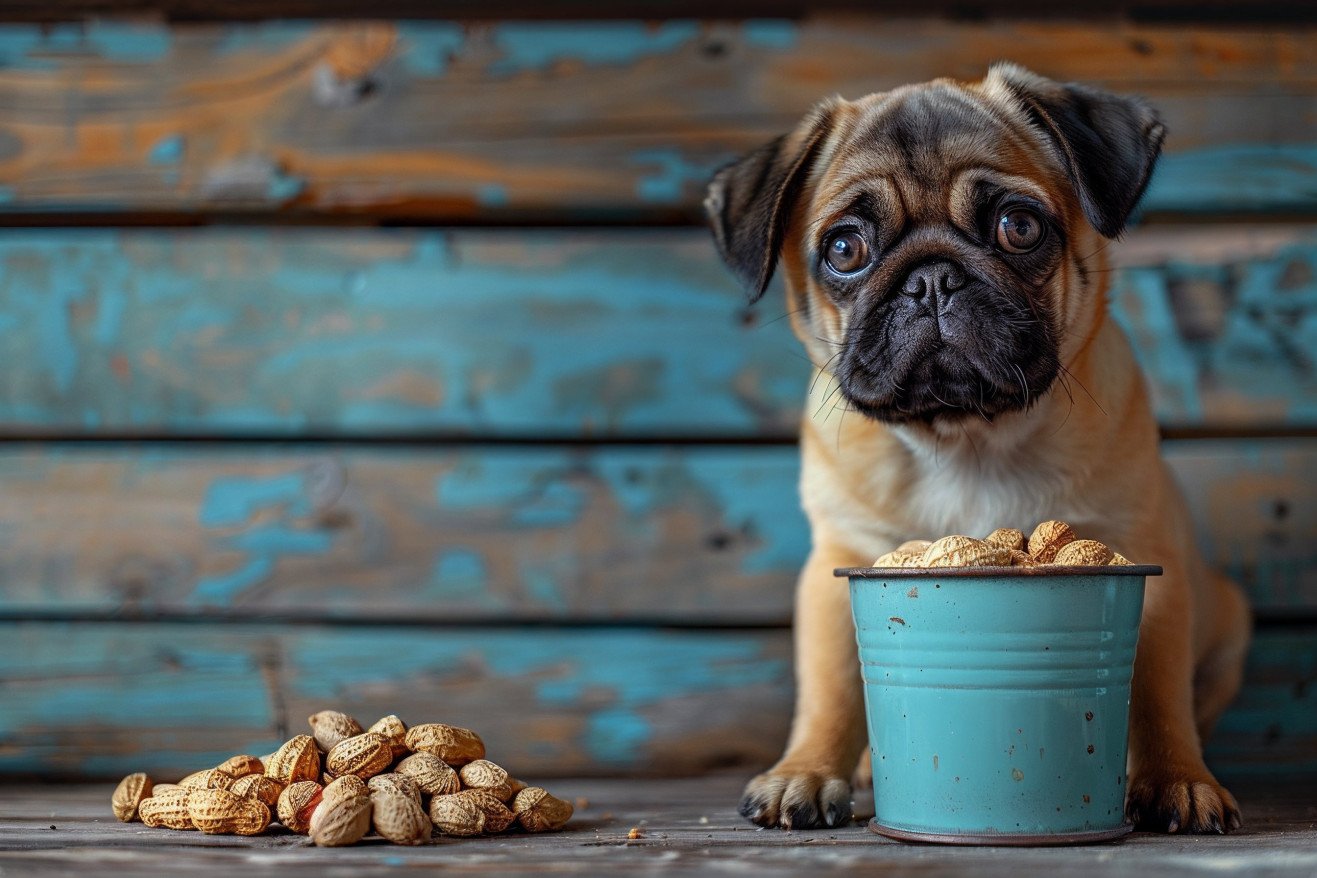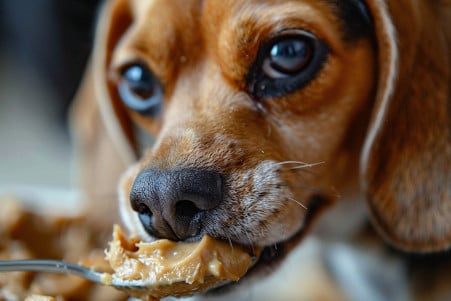Can Dogs Eat Peanut Shells? A Look at Peanuts for Pups
17 April 2024 • Updated 16 April 2024

While some dogs may be able to pass peanut shells without issues, they are not recommended as they pose a significant risk of intestinal obstruction or puncture. The tough, fibrous shells are very difficult for dogs to digest properly and can cause vomiting, diarrhea, and even potentially fatal intestinal blockages if consumed in large quantities.
That said, let's take a closer look at the research to find out if peanuts themselves are safe for dogs to eat. We'll review veterinary studies to determine if peanuts are a good option for dogs as an occasional treat or if they come with too many concerns, including allergies, aflatoxins, and high fat content. This way, you can better understand how to feed your dog a diet that's both healthy and safe.
Can dogs eat peanut shells?
Peanut Butter: A Healthier Option for Dogs?
While peanut shells are definitely off-limits for dogs, peanut butter can be a healthy and nutritious snack in small amounts, says Pets Best. The important thing is to select an unsalted, natural peanut butter that doesn’t contain any added sugar or artificial sweeteners like xylitol, which is extremely poisonous to dogs and can lead to liver failure and death if consumed, according to the ASPCA.
Peanut butter can be a good source of protein, vitamins, and healthy fats for dogs, but it should be limited to no more than 10% of a dog’s daily caloric intake because of its fat content, says the American Kennel Club. To ensure that it doesn’t contain any unhealthy ingredients, Blue Cross suggests using homemade peanut butter or brands that are made specifically for dogs.
Although peanut butter can be a nutritious and occasional treat, peanut shells present potential dangers as a dog chew toy that pet parents should take into consideration.
Peanut Shells as Chew Toys: Potential Hazards
Peanut shells are not recommended as dog chews because they are abrasive and can cause digestive issues, notes The Dodo. If a dog eats a peanut shell, pet parents should watch for signs of digestive distress, such as diarrhea, vomiting, or tummy trouble. According to Rover.com, peanut shells can also be a choking hazard, especially for small dogs and dogs that are prone to eating too quickly.
Although peanut shells are not poisonous, WebMD explains that they can still cause blockages or tears in the intestines if they are eaten in large amounts. If a dog experiences any serious or ongoing symptoms after eating a peanut shell, it’s important to get them to a vet right away. Pet parents should also make sure to keep peanut shells out of their dog’s reach.
First Aid and Emergency Treatment for Peanut Shell Consumption
If a dog has consumed a large amount of peanut shells, it may require immediate veterinary care. Per the Cornell University College of Veterinary Medicine, dog owners should call their vet or an emergency animal hospital to see if they should induce vomiting or bring their pet in for treatment. It's important to note that inducing vomiting is not always the best course of action and can be harmful if not done correctly or in certain circumstances.
Hepper explains that if a dog is experiencing vomiting, diarrhea, or bloody stool, it could be a sign of a more serious issue and should be addressed by a vet immediately. When taking a dog to the vet, it's important to provide information about the substance the dog consumed, when it was consumed, and how much was consumed so that the vet can make an informed decision about the best way to treat the dog.
If a dog is experiencing any serious or long-term side effects after consuming peanut shells, it's important to take them to the vet as soon as possible. With the right information, dog owners can make sure that their pets are safe and healthy.
Peanut Allergies in Dogs: How to Know If Your Dog Is Allergic to Peanuts
Just like humans, dogs can develop an allergy to peanuts, even if they have eaten them in the past without any issues. VCA Animal Hospitals explains that food allergies are one of the most common types of allergies in dogs. The immune system can become hypersensitive and create antibodies to things it would normally accept, like the proteins or complex carbohydrates found in peanuts.
Signs of a peanut allergy in dogs can include itching, redness, hair loss, vomiting, diarrhea, and in the most severe cases, anaphylactic shock. Peanut allergies in dogs can be diagnosed through skin or blood tests and an elimination diet trial, which involves feeding the dog a diet with a limited number of ingredients for several weeks and then slowly reintroducing potential allergens to see which one causes a reaction.
There is no cure for food allergies in dogs, so it's important to figure out what your dog is allergic to and make sure they don't eat it. If you can do that, dogs with peanut allergies can be healthy and happy. That said, it's also important to remember that just like with any other kind of food allergy, you should always keep an eye on your dog and get them to a vet if they have a severe reaction.
Conclusion: Use Peanut Products in Moderation and With Care
Peanut shells should be avoided entirely for dogs because of the risk of choking, intestinal blockage, and other digestive problems. PetMD warns that peanuts that aren't shelled can become a choking hazard for dogs, or even cause an intestinal blockage. In addition, raw peanuts can be contaminated with a fungus called aflatoxin, which can lead to liver damage in dogs.
Peanut butter can be a healthy and safe snack for dogs as long as it's given in moderation and is unsalted, natural, and free of toxic additives like xylitol. The American Kennel Club notes that peanut butter should be limited to no more than 10% of a dog's daily calories because of its high fat content. Dog owners should always read labels and be aware of serving sizes when giving peanut butter to their pets.
Dogs can be allergic to peanuts, so pet owners should be on the lookout for signs of an allergic reaction and talk to a vet if they have concerns. In general, it's always best to talk to a veterinarian before adding new foods or snacks to a dog's diet.


